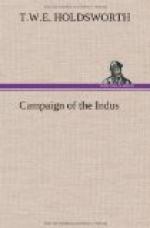I am sorry to say that we have a great many men in the hospital now, and four officers on the sick list; two of them very unwell. All the cases are bowel complaints, and most of them dysentery. This is the case generally. While on the march, soldiers seldom feel it; but when the halt afterwards comes, then they get touched up awfully. However, it is not to be wondered at, when one considers the quantity of duty which they have to perform at present. Out-lying and in-lying pickets, and guards, &c.; add to which, the being suddenly transported from the climate of India, to which most of them have become inured by a residence, on the average, of twelve years, to this comparatively cold and changeful climate, is enough of itself to shake them a little. They have also done what no Indian troops have done before: in marching in India, almost everything is carried for the soldier; he merely carries what he does on parade—viz., his firelock and accoutrements. Our regiment though, by-the-bye, has always carried a blanket, with a clean shirt and stockings and flannel waistcoat wrapped up in it, that they may be enabled to change as soon as they have marched in. On this march, each man has carried his knapsack, with his kit in it, twenty rounds of ammunition, a havresack with his day’s rations, and a small round keg containing water, the weight of all which is no joke. While at Bominacote, we fully expected to have a little fighting after passing Tatta, and on our arrival here we heard a report which induced us to believe that we should have a brush with the Ameers very shortly; but it appears now that the Ameers have seen the folly of such proceedings, and have determined to receive us amicably, and to assist our passage through their country, and that it was only one of the Ameers that was inclined to be restive. He endeavoured to stop our camels, &c., and managed to do so for some time, and collected as much of what they call an army as he could—about 5000 of these Beloochees, but with no guns, or anything of that sort. However, on collecting them, they represented to him that the British troops were behaving so well, and the inhabitants of the country were getting so much more money for their articles of sale than they ever got before, that they considered it was more for their profit and advantage that the English should march through their country than that they should oppose them, and get licked into the bargain, as they were sure they would be. All eastern nations have an awful dread of European artillery. It also happened that the poor Ameer had unfortunately not the wherewithal to carry on the war, and his army made excessively high demands on him, you may be sure. The consequence of all which was, that the army dissolved itself as quietly as possible, and the poor Ameer found himself solus. The result is, that a deputation is now here, with a small force from the head Ameer, at Hydrabad, under the command of Nur Mahomed, another Ameer, and that he has made most ample apologies for the conduct of his brother Ameer, and offered not only to let us pass through his country, but to assist us in so doing to the utmost of his power. It was indeed well for the Ameers that they came to this decision, as had they acted contrary we should have taken possession of their country to a moral certainty. Now they have a chance of keeping half the loaf.




